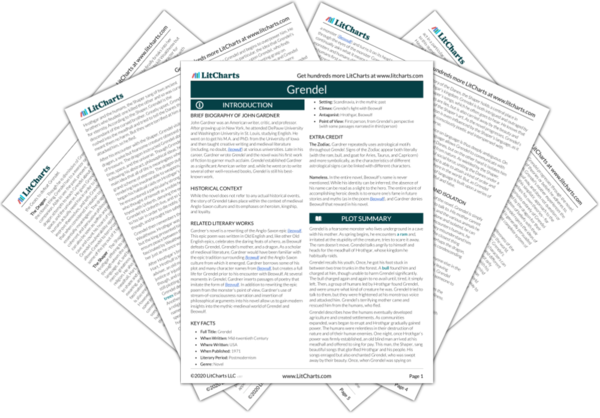For much, if not all, of the novel, Grendel is simply looking for someone to talk to. His mother cannot communicate with him, and the various animals he addresses cannot respond. Utterly alone and isolated, he can talk only to himself. When he finally encounters humans, he tries to communicate with them, but they misunderstand him and brand him as a terrifying monster. The closest thing Grendel has to a friend or companion is perhaps the dragon, whom he meets only once. But the dragon is condescending and dismissive of Grendel.
Grendel’s most significant relationship with anyone else in the novel is with his rivals Hrothgar and Unferth. By leaving Unferth alive and by never killing all of the Danes, Grendel plays a kind of game with his rivals that leaves him someone to interact with.
Gardner’s rewriting of the character of Grendel makes the monster sympathetic largely through his pathetic loneliness. His violent outbursts and antagonistic relationship with humans can be seen as the result of a lonely creature’s misunderstood attempts to reach out and communicate with someone else.
Loneliness and Isolation ThemeTracker

Loneliness and Isolation Quotes in Grendel
Behind my back, at the world’s end, my pale slightly glowing fat mother sleeps on, old, sick at heart, in our dingy underground room. Life-bloated, baffled, long-suffering hag. Guilty, she imagines, of some unremembered, perhaps ancestral crime. (She must have some human in her.) Not that she thinks. Not that she dissects and ponders the dusty mechanical bits of her miserable life’s curse.

Unlock explanations and citation info for this and every other Grendel quote.
Plus so much more...
Get LitCharts A+Talking, talking, spinning a spell, pale skin of words that closes me in like a coffin.
I tried to tell her all that had happened, all that I’d come to understand: the meaningless objectness of the world, the universal bruteness. She only stared, troubled at my noise. She’d forgotten all language long ago, or maybe had never known any.
“Why can’t I have someone to talk to?” I said. The stars said nothing, but I pretended to ignore the rudeness.
It was a cold-blooded lie that a god had lovingly made the world and set out the sun and moon as lights to land-dwellers, that brothers had fought, that one of the races was saved, the other cursed. Yet he, the old Shaper, might make it true, by the sweetness of his harp, his cunning trickery. It came to me with a fierce jolt that I wanted it. As they did too, though vicious animals, cunning, cracked with theories. I wanted it, yes! Even if I must be the outcast, cursed by the rules of his hideous fable.
I discovered that the dragon had put a charm on me: no weapon could cut me. I could walk up to the meadhall whenever I pleased, and they were powerless. My heart became darker because of that. Though I scorned them, sometimes hated them, there had been something between myself and men when we could fight. Now, invulnerable, I was as solitary as one live tree in a vast landscape of coal.
What will we call the Hrothgar-Wrecker when Hrothgar has been wrecked?
I recall something. A void boundless as a nether sky. I hang by the twisted roots of an oak, looking down into immensity. Vastly far away I see the sun, black but shining, and slowly revolving around it there are spiders. I pause in my tracks, puzzled—though not stirred—by what I see. But then I am in the woods again, and the snow is falling, and everything alive is fast asleep. It is just some dream. I move on, uneasy; waiting.
Tedium is the worst pain.
I am mad with joy. –At least I think it’s joy. Strangers have come, and it’s a whole new game.











